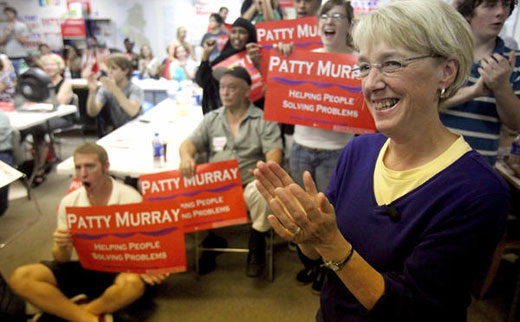
WASHINGTON (PAI) – Money to repair the nation’s crumbling roads and rehab its creaky mass transit lines will run out by July, a key lawmaker on budget issues warns.
In an Apr. 8 floor speech, Senate Budget Committee Chairman Patty Murray, D-Wash., added that the highway-mass transit trust fund could be exhausted by then, bringing construction projects to a dead halt at the height of construction season.
That would not only force present construction workers off the job, but prevent future hiring, she added. Indeed, the uncertainty over the future funding has already stopped highway projects in Arkansas, Colorado, and elsewhere, she said.
All that harm and a crisis could be avoided if Congress approves a new long-term highway-mass transit bill – and the federal gas tax that funds the projects – before the current law expires on Sept. 30, she added. She pleaded with colleagues to set aside partisan sniping and do so.
Laborers President Terry O’Sullivan made the same points. Murray and O’Sullivan cited federal data for their warning that the trust fund is about to run out of cash.
“With the Department of Transportation now warning of a shortfall in the highway trust fund as early as this summer, Congress needs to get moving right away on a highway bill reauthorization before it is too late,” O’Sullivan said.
“Cities and states that rely on this funding to keep our highways efficient and safe will soon be forced to delay or cancel critical new projects, which could be catastrophic to the construction industry and have a damaging ripple effect throughout the economy.
“With an 11.3 percent construction unemployment rate, we still have plenty of workers who are ready and willing to rebuild our congested, pot-hole ridden and dangerous roads and bridges,” he pointed out.
“If Congress doesn’t act, we are headed toward crisis in just a few months,” Murray warned. It would be “a construction shutdown that could ramp up when the highway trust fund reaches critically low levels, and get worse and worse if we don’t solve the problem.”
Murray pleaded for bipartisan support to renew the trust fund with a new highway-mass transit bill. She may get it in the Senate, but the GOP-run House is another matter. There, the Tea Partyites who control the GOP oppose highway spending and laws to help workers.
“As soon as July – just a few months from now – the Department of Transportation predicts the highway trust fund will reach a critically low level,” Murray explained. “If this isn’t resolved, construction projects to improve our roads and bridges could shut down and leave workers without a paycheck.”
“This crisis could also cost jobs,” she warned. “Construction is at its peak in the summer months. But without funding, states might have no choice but to stop construction and leave workers without a job.
“This is unacceptable, and it’s unnecessary. Congress must act to avoid this construction shutdown. There is no reason to lurch to another avoidable crisis when workers and families across the country are still struggling.”
While Murray and O’Sullivan warned of one looming transportation funding crisis, the tax-writing Senate Finance Committee took a small step in the same field. It voted to restore the full pre-tax mass transit voucher subsidy, $250 monthly, that employers could give to workers to take buses and subways to their jobs.
Until the end of 2013, vouchers for both mass transit users and drivers were $245 monthly. The transit voucher dropped to $130. The parking voucher rose to $250. The Finance Committee voted to make them equal and make the mass transit voucher retroactive to Jan. 1, undoing prior congressional inaction. That led union leaders to turn their attention to the GOP-run tax-writing Ways and Means Committee.
“Without action, there will remain a bias in the tax code against public transpor-tation, the millions of working people” who use it and firms that use the benefit to cut payroll costs, AFL-CIO Transportation Trades Department President Ed Wytkind wrote.
“The transit tax benefit allows employers to use pre-tax dollars to pay for employees’ transit expenses. By reducing payroll taxes, commuters save as much as $2,940 a year on their transit costs. The tax benefit also incentivizes the use of public transportation, which reduces commutes, keeps people employed and makes transportation accessible and affordable for all,” he added.
The split between the declining transit voucher and the rising parking voucher “is an effective tax on transit users” and hits hardest at the 70 percent of transit users who are working families or poor, Wytkind said. “The status quo” – the split – “is unacceptable.”
Treasury Employees President Colleen Kelley gave Ways and Means the same points: “The mass transit benefit provides much needed relief in reduced commuting costs for many working people…Restoring it to parity with parking also encourages greater transit ridership, which helps lessen congestion on the roadways, reduces pollution, conserves energy, and saves money in road construction and maintenance.”
Photo: Sen. Patty Murphy. Erika Schultz/AP

MOST POPULAR TODAY

High Court essentially bans demonstrations, freedom of assembly in Deep South

Zionist organizations leading campaign to stop ceasefire resolutions in D.C. area

U.S. imperialism’s ‘ironclad’ support for Israel increases fascist danger at home

UN warns that Israel is still blocking humanitarian aid to Gaza







Comments